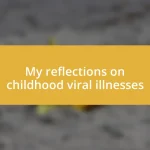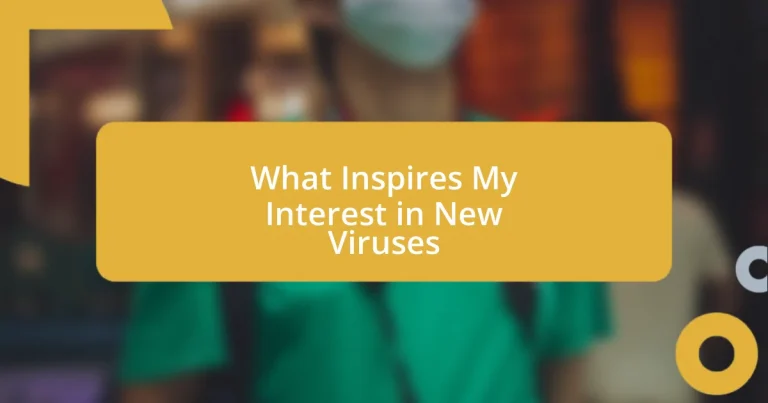Key takeaways:
- Viruses have a dual nature as both threats to health and potential allies in gene therapy, highlighting their complex impact on society.
- Current trends in virology research, such as mRNA vaccine development and zoonotic studies, showcase the evolving landscape of virus understanding and response.
- Global virus awareness is crucial for public health, as it fosters resilience and informs communities, ultimately empowering them to take preventive measures against outbreaks.
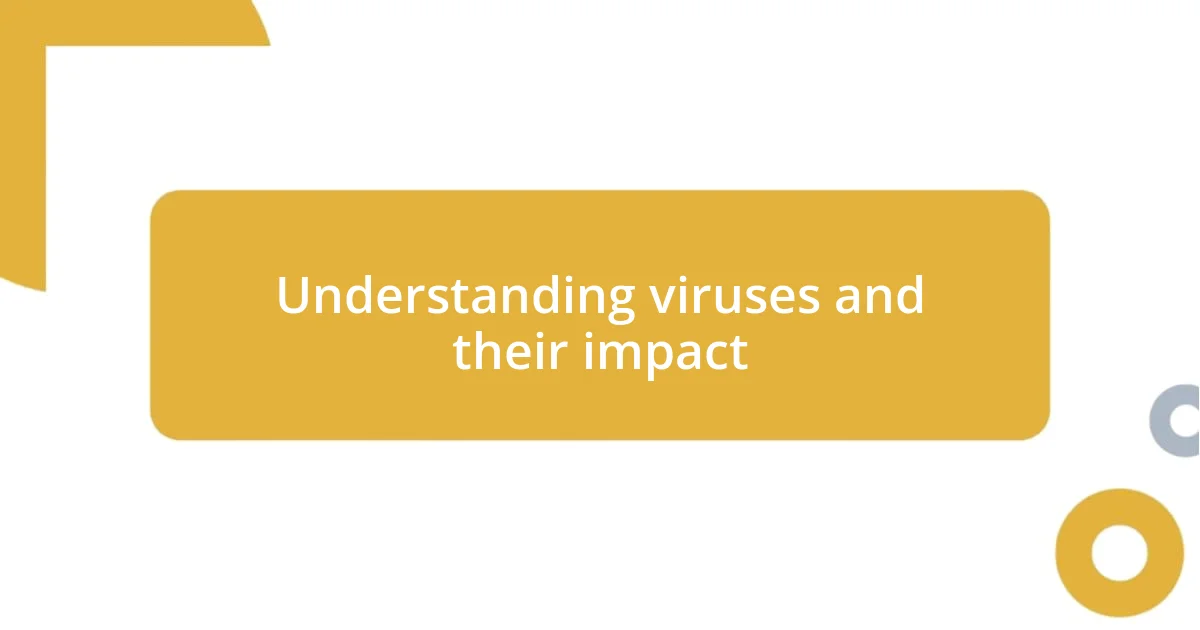
Understanding viruses and their impact
Viruses are fascinating yet complex entities that challenge our understanding of life itself. I remember first diving into the intricacies of how they operate during my biology classes, particularly the moment I learned about their ability to hijack host cells. It’s incredible to think about how something so small can have such profound effects on entire populations and ecosystems.
The impact of viruses on health and society can be staggering. Reflecting on the last few years, I feel a mix of concern and curiosity; COVID-19 has reshaped our world in ways we never anticipated. How can something invisible lead to such visible disruption? This constant battle with viruses makes me ponder our resilience and adaptability.
Moreover, viruses aren’t exclusively harmful; they also have potential benefits. For instance, I’ve been intrigued by the application of certain viruses in gene therapy. It raises an interesting thought: could our biggest adversaries also be our greatest allies? Embracing the complexity of viruses allows me to appreciate their dual nature and the lessons they impart.
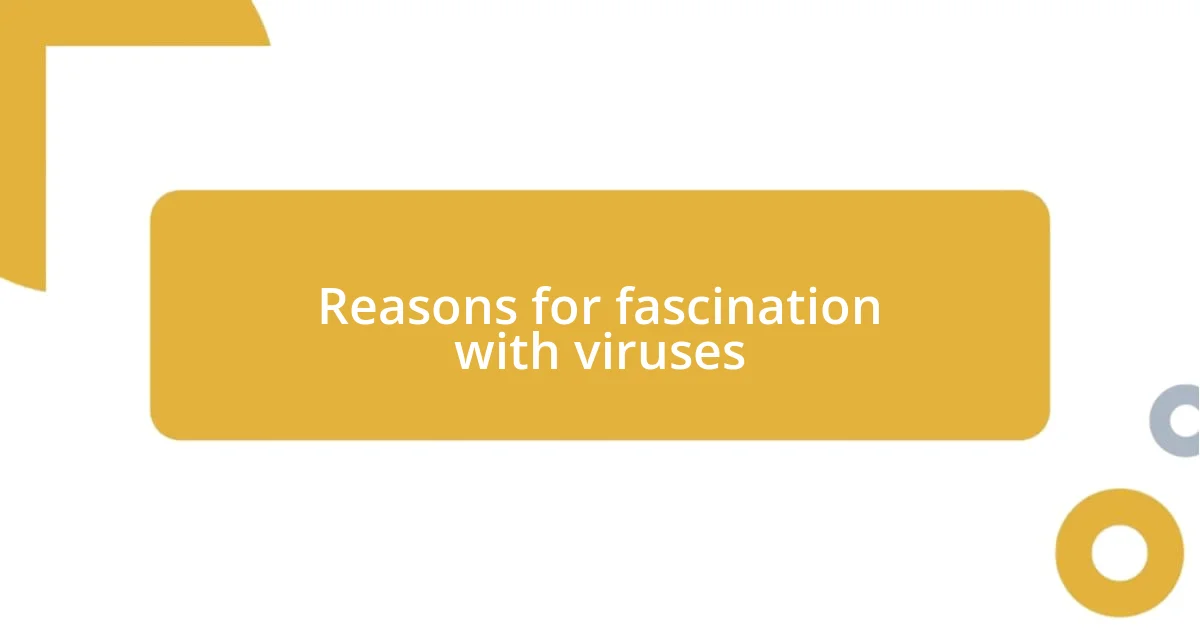
Reasons for fascination with viruses
Viruses have an almost eerie allure, don’t you think? It’s their ability to adapt and evolve rapidly that constantly captures my attention. I distinctly recall a moment while watching a documentary on virology when I was reminded of how quickly a virus can mutate, sometimes outpacing our medical responses. It makes me feel both fascinated and slightly intimidated by the sheer resilience of these microscopic challengers.
Another reason for my fascination stems from the societal narratives that unfold during viral outbreaks. I will never forget the community response when news of a new virus broke out in my hometown. People banded together in unique ways, showcasing both fear and solidarity. Observing how humanity reacts to these crises reveals so much about our collective psychology and highlights the unexpected strengths that emerge in tough times.
Lastly, I find the scientific quest to understand viruses deeply inspiring. The people dedicated to virology remind me of superheroes; they’re constantly racing against the clock to decode these biological puzzles. During my journey exploring this field, I’ve connected with passionate researchers who share their investigations and discoveries, igniting my own passion for learning. Their drive and commitment mirror the excitement of any good adventure story, filled with twists and turns that keep you on the edge of your seat.
| Aspect | Reason for Fascination |
|---|---|
| Adaptability | The rapid mutation of viruses challenges our scientific understanding and responses. |
| Societal Impact | Viral outbreaks reveal human resilience and the intricacies of social behavior. |
| Scientific Pursuit | The dedication of researchers in unraveling virus complexities is inspiring and adventurous. |
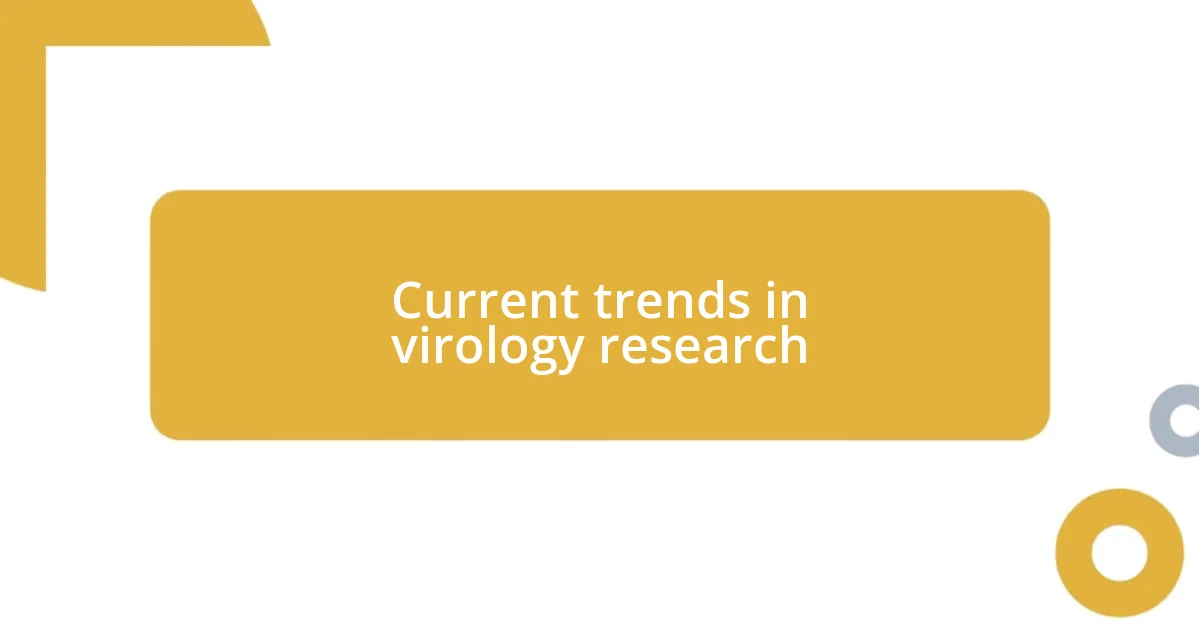
Current trends in virology research
The field of virology is evolving at an exhilarating pace. I can’t help but feel amazed by how our understanding of viruses expands with each new discovery. For example, leveraging advanced technologies like CRISPR has sparked an innovative approach to gene editing. It’s almost surreal when I think about how these methods can potentially reprogram viral genomes, offering hope for future therapies.
Here are some of the current trends in virology research that particularly resonate with me:
- Vaccine Development: mRNA technology, first utilized in COVID-19 vaccines, is now being explored for various viruses, highlighting a groundbreaking shift in vaccine strategies.
- Viral Genomics: Sequencing the genetic material of viruses enables scientists to track mutations and evolution, which is crucial for timely interventions.
- Bioinformatics Tools: The integration of artificial intelligence in virology is enhancing our ability to predict viral outbreaks and origins, providing valuable insights into prevention.
- Zoonotic Studies: With the frequent emergence of viruses crossing species barriers, research is increasingly focused on understanding zoonotic pathogens and their transmission pathways.
I’ve often thought about my initial encounters with virology during coursework, where I saw the power of these emerging technologies unfold before my eyes. Each slide in a presentation felt like unwrapping a new gift, revealing layers of possibilities that could change the future of medicine. It’s this thrilling wave of exploration that keeps me inspired and engaged in the ever-evolving world of viruses.
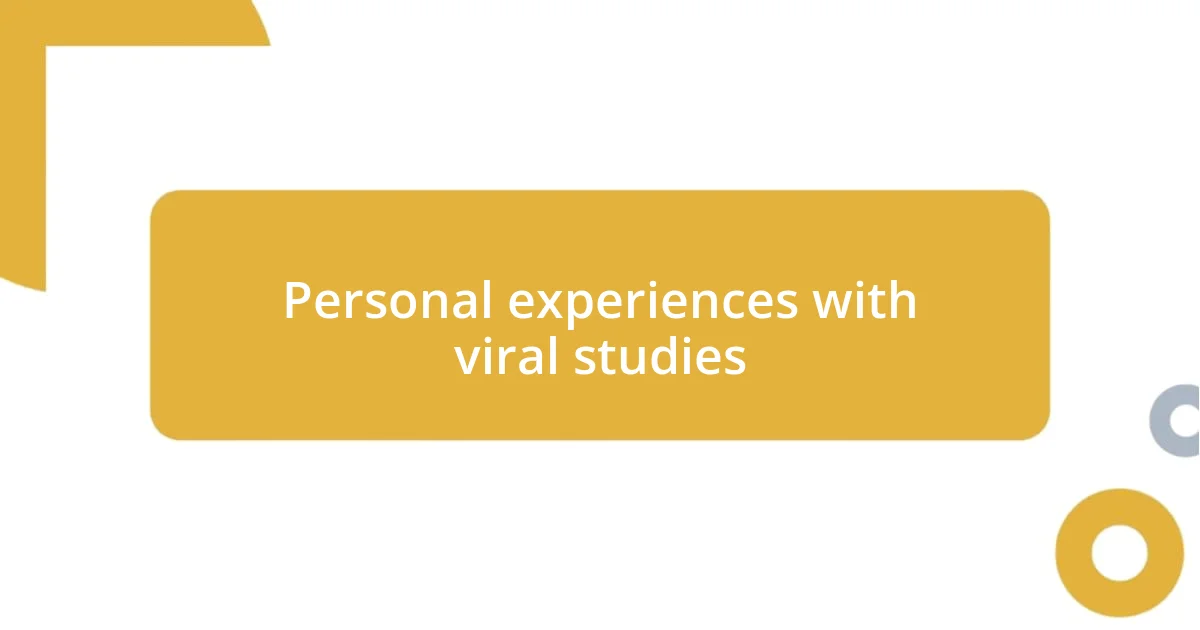
Personal experiences with viral studies
I remember attending my first virology seminar, where researchers shared their groundbreaking studies. The energy in the room was palpable; everyone seemed eager to share their findings. I found myself captivated by a presentation on how a team isolated a new virus in a remote part of the world. Listening to the presenter recount their fieldwork experiences—hiking through jungles and taking samples in the early morning dew—made me appreciate the human element in scientific exploration. Have you ever felt overwhelmed by the passion of those around you? It’s infectious!
As I delved deeper into viral studies during my educational journey, practical lab work left a profound impression on me. The hands-on experience of working with viral cultures in a controlled environment felt surreal. I vividly recall the first time I successfully observed viral replication under a microscope. It was like witnessing a hidden world come to life! The thrill of seeing that rapid cycle unfold before my eyes sparked an insatiable curiosity. How could something so tiny have such a massive impact on our health?
Connecting with experienced virologists has been one of the most rewarding aspects of my journey. I remember a mentor who encouraged me to ask questions that stretched beyond the surface; he often said, “Curiosity is your greatest asset.” I took this to heart and found myself exploring the ethical implications of viral research. The dialogues sparked by such inquiries opened my eyes to the broader ramifications of our work. Isn’t it fascinating how each conversation can shift your perspective and deepen your understanding? Every interaction continues to enrich my passion for virology, reminding me that the study of viruses is as much about exploring our humanity as it is about understanding these complex pathogens.
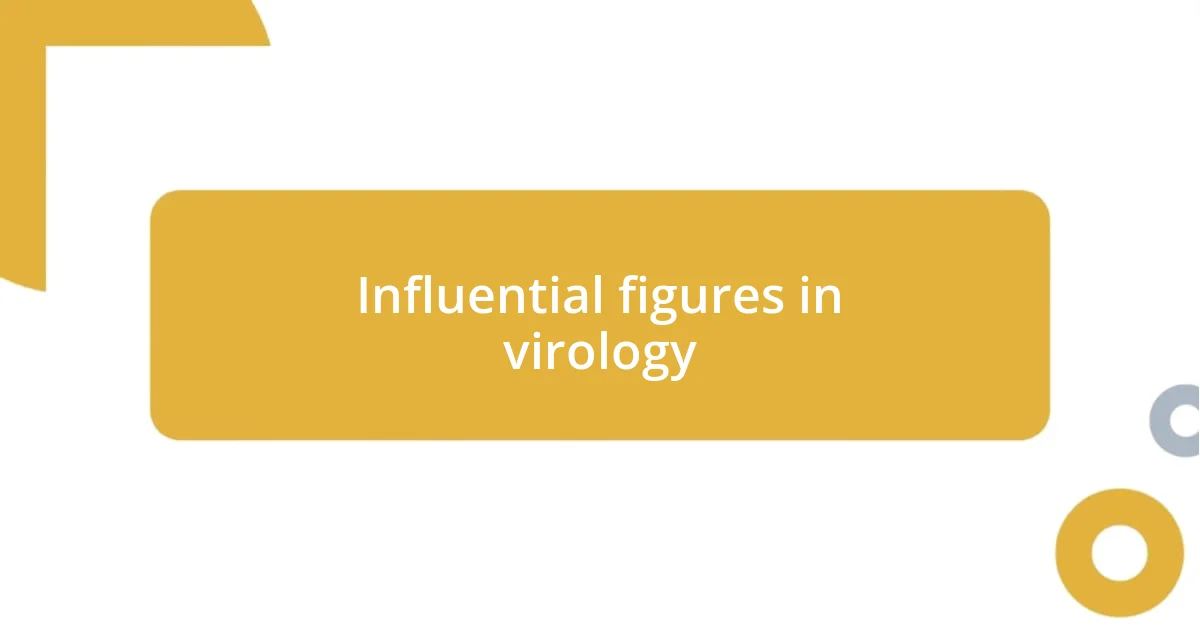
Influential figures in virology
Some influential figures in virology have profoundly shaped my interest in this fascinating field. Take, for instance, Dr. Albert Sabin, who developed the oral polio vaccine. I often think about how his vaccine not only transformed public health but also inspired a wave of virologists who sought to create similar breakthroughs. Isn’t it awe-inspiring to realize that one person’s determination can lead to countless lives being saved?
Another figure worth mentioning is Dr. Yoshihiro Kawaoka, who has made significant strides in understanding influenza viruses and their potential to cause pandemics. I’ve followed his research closely, and I remember feeling a mix of anxiety and excitement as I read about his experiments involving avian flu strains. It really hits home how interconnected our world is when one scientist’s work can have global implications. Have you ever imagined how different our response to outbreaks might have been without his contributions?
Lastly, I can’t overlook the impact of Dr. Francis Collins, who has emphasized collaboration in research. I recall a discussion I had with a fellow student about how his leadership in the Human Genome Project has accelerated our understanding of viral genetics. His approach is a reminder that virology is a team effort, requiring diverse minds to tackle complex problems. How does collaboration empower you in your journey? It certainly makes me appreciate the diverse perspectives that lead to significant advancements in virology!
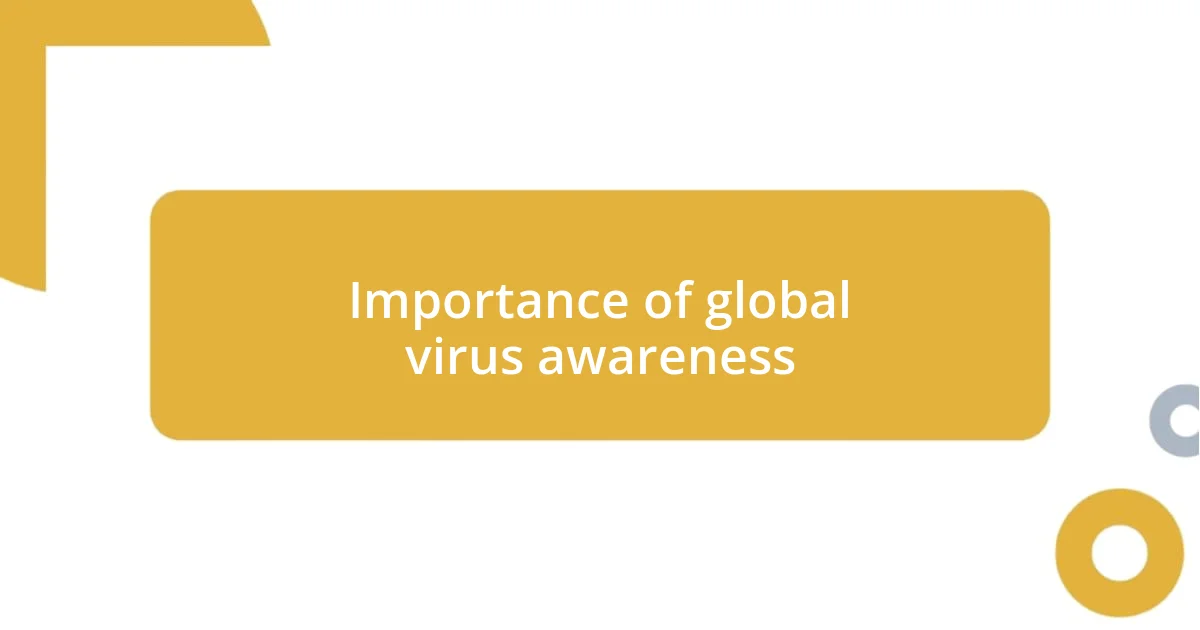
Importance of global virus awareness
The significance of global virus awareness can’t be overstated. I still vividly remember a moment during an international virology conference when an expert shared data on how swiftly a new virus can cross borders. It struck me then how insufficient localized knowledge can lead to global panic. How often do we take for granted the interconnectedness of our world? The truth is, a threat in one region can become everyone’s problem, highlighting the urgent need for awareness.
When I engage in conversations about viral outbreaks, I’m often surprised by how many people underestimate the importance of shared information. I once had a discussion with a friend who believed viruses were only a concern for scientists. I passionately argued that public health initiatives thrive on a well-informed public. Did you know that simple awareness campaigns have been proven to reduce transmission rates during outbreaks? It’s enlightening to see how a little knowledge can empower communities to take preventive measures.
On a personal note, I’ve encountered firsthand the anxiety that shrouds a new virus discovery. During one particular outbreak, I found myself watching the news daily, filled with a mix of fear and fascination. I realized that global virus awareness was not just about information; it was about fostering resilience in communities. I often ask myself, “What if we all prioritized learning about emerging viruses?” It’s clear to me that awareness can lead to proactive behaviors, ultimately saving lives. That, to me, is a profound realization worth sharing.
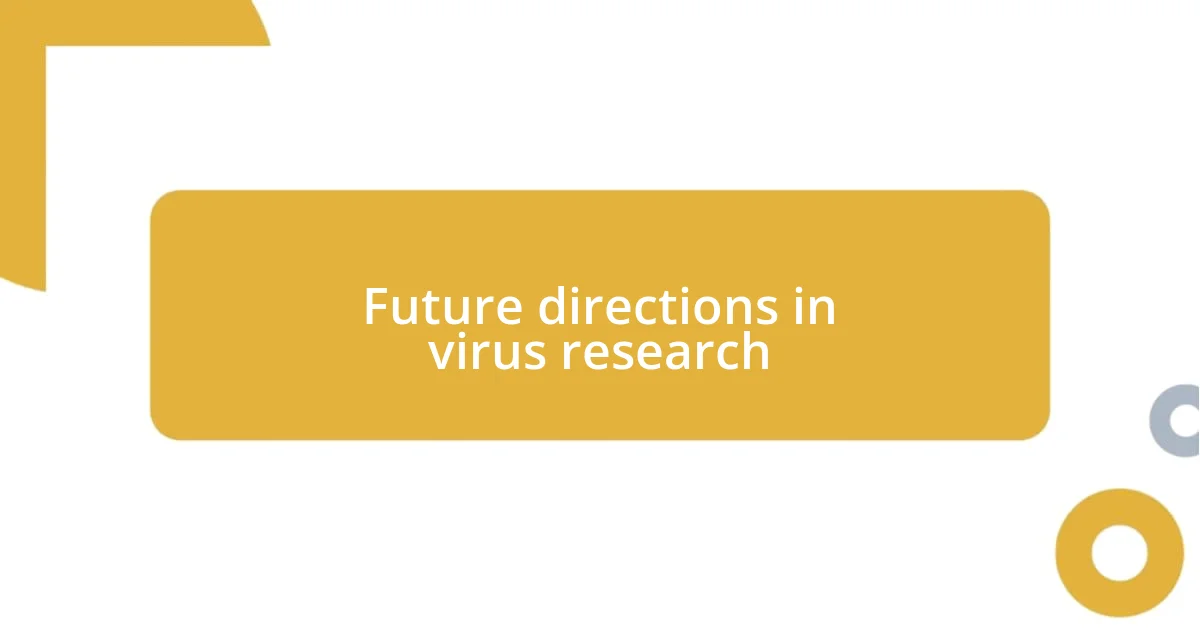
Future directions in virus research
Future directions in virus research are incredibly exciting, as researchers are increasingly turning to advanced technologies like CRISPR and machine learning to combat viral threats. I recall a workshop I attended where scientists demonstrated how these tools could potentially edit viral genomes. It’s thrilling to think about the possibilities—could we harness these innovations to prevent outbreaks before they even start?
Emerging viruses continue to pose challenges, and there’s a strong push for better surveillance systems worldwide. I remember discussing this with a mentor who emphasized the importance of real-time data analysis. Imagine if we could track viral mutations as they happen—how much more equipped would we be to respond swiftly? It’s a game-changer in understanding and managing virology at a global scale, isn’t it?
I also ponder the role of interdisciplinary approaches in future virus research. Drawing from fields like environmental science and genomics can provide fresh insights into how viruses interact with their hosts and ecosystems. I once collaborated with ecologists, and it was remarkable to see how their different perspectives helped us identify patterns in viral behavior that we might have overlooked. Does it not make you wonder how many groundbreaking discoveries await? The synergy of diverse fields could illuminate paths we’ve yet to explore in this ever-evolving domain.









